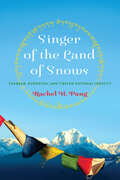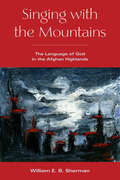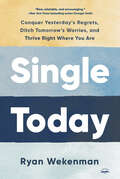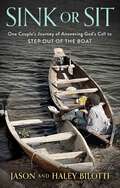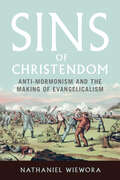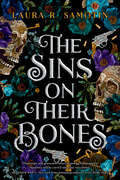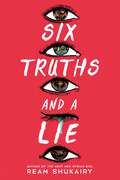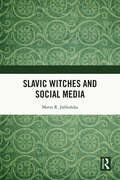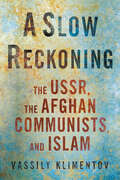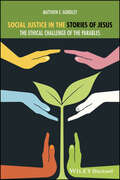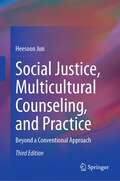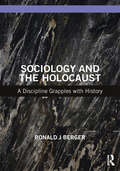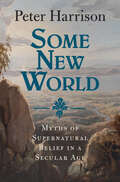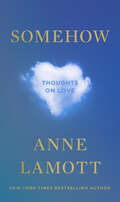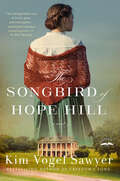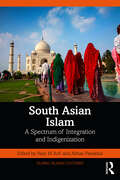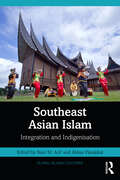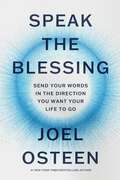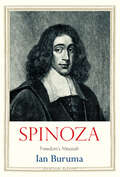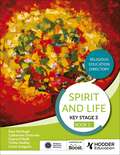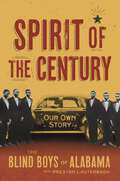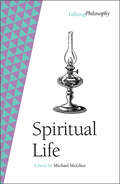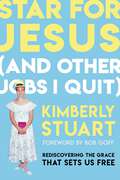- Table View
- List View
Singer of the Land of Snows: Shabkar, Buddhism, and Tibetan National Identity (Traditions and Transformations in Tibetan Buddhism)
by Rachel H. PangThe singular role of Shabkar in the development of the idea of Tibet Shabkar (1781–1851), the &“Singer of the Land of Snows,&” was a renowned yogi and poet who, through his autobiography and songs, developed a vision of Tibet as a Buddhist &“imagined community.&” By incorporating vernacular literature, providing a narrative mapping of the Tibetan plateau, reviving and adapting the legend of Tibetans as Avalokiteśvara&’s chosen people, and promoting shared Buddhist values and practices, Shabkar&’s concept of Tibet opened up the discursive space for the articulation of modern forms of Tibetan nationalism. Employing analytical lenses of cultural nationalism and literary studies, Rachel Pang explores the indigenous epistemologies of identity, community, and territory that predate contemporary state-centric definitions of nation and nationalism in Tibet and provides the definitive treatment of this foundational figure.
Singing with the Mountains: The Language of God in the Afghan Highlands
by William ShermanAn illuminating story of a Sufi community that sought the revelation of God.In the Afghan highlands of the sixteenth century, the messianic community known as the Roshaniyya not only desired to find God’s word and to abide by it but also attempted to practice God’s word and to develop techniques of language intended to render their own tongues as the organs of continuous revelation. As their critics would contend, however, the Roshaniyya attempted to make language do something that language should not do—infuse the semiotic with the divine. Their story thus ends in a tower of skulls, the proliferation of heresiographies that detailed the sins of the Roshaniyya, and new formations of “Afghan” identity.In Singing with the Mountains, William E. B. Sherman finds something extraordinary about the Roshaniyya, not least because the first known literary use of vernacular Pashto occurs in an eclectic, Roshani imitation of the Qur’an. The story of the Roshaniyya exemplifies a religious culture of linguistic experimentation. In the example of the Roshaniyya, we discover a set of questions and anxieties about the capacities of language that pervaded Sufi orders, imperial courts, groups of wandering ascetics, and scholastic networks throughout Central and South Asia.In telling this tale, Sherman asks the following questions: How can we make language shimmer with divine truth? How can letters grant sovereign power and form new “ethnic” identities and ways of belonging? How can rhyme bend our conceptions of time so that the prophetic past comes to inhabit the now of our collective moment? By analyzing the ways in which the Roshaniyya answered these types of questions—and the ways in which their answers were eventually rejected as heresies—this book offers new insight into the imaginations of religious actors in the late medieval and early modern Persianate worlds.
Single Today: Conquer Yesterday's Regrets, Ditch Tomorrow's Worries, and Thrive Right Where You Are
by Ryan WekenmanAn empowering guide to the gift of singleness that will help you leave shame in the past and let go of anxiety about the future in order to thrive today—from a thirtysomething single pastor who understands that the struggle is real.&“Raw, relatable, and encouraging.&”—New York Times bestselling author Granger SmithRyan Wekenman has been an unmarried pastor for over a decade. He&’s heard all the usual questions: &“Are you dating anyone? Any wedding plans in the future?&” But he knows the real question they&’re asking is, &“Hey, do you think you&’ll be single for the rest of your life?&”Ryan believes that singleness isn&’t a curse to endure. Rather, it&’s a gift to enjoy, even if at times it can be hard to see it that way. But he has discovered firsthand—and from hundreds of meetings with other single people—that we are often consumed by regrets or shame from the past, together with worry or fear of the future, making it feel impossible to find peace in the present.But it doesn&’t have to be that way. Single Today shares Ryan&’s perceptive anecdotes, thought-provoking questions, biblical insight, and disarming humor as he invites you into his journey of learning to fully embrace his current reality.Single Today will encourage you to• gain practical tools to help handle the annoying and uncomfortable situations single people get placed in• learn how to talk to family and friends about your singleness with confidence• practice opening your heart and embracing true intimacy• stop believing your marital status is keeping you stuck• start living the full and abundant life available todayNo amount of shame will change the past, and no amount of worry will fix the future, but with a little faith and work, you can start thriving today.
Sink or Sit: One Couple's Journey of Answering God's Call to Step Out of the Boat
by Jason Bilotti Haley BilottiJason and Haley Bilotti&’s Sink or Sit will inspire and challenge readers to get out of their comfort zones and step into God&’s call, to stop sitting in place but to be willing to take risks, even if that means sinking while doing it.It&’s probably happened to you. You felt that nudge, an urge, from deep inside you, calling you out of your comfort zone. Calling to you to take a risk. You have felt that call from God, asking you to step out of the boat, to do something significant. Jason and Haley Bilotti each felt it—for years. But as they began to have children and their obligations with Chick-fil-A grew, they didn&’t see a way to answer the call of their hearts: to serve God through missions. When the opportunity presented itself for them to take separate missions trips, they learned just how creative God truly is. They began leading separate teams to Niger, in western Africa, and to serve the neediest of all, the children. Through their work with Schools for Niger, Africa, an organization the Bilottis and their business associates started, they found inroads to countless communities throughout Niger. Their work also led them to meet their future son, Rachid, a child they first sponsored and later adopted. Jason and Haley tell their touching story using alternating perspectives, while also bringing in their grown children to help tell it from their own points of view. In reading this book, you will sense their passion for serving the lost and forgotten, and you will feel the love they have for the people God has brought their way. The Bilottis&’ story, Sink or Sit, will both inspire and empower you to take your own leap. To get out of that boat. To trust that sinking is better than sitting.
Sins of Christendom: Anti-Mormonism and the Making of Evangelicalism
by Nathaniel WieworaEvangelical criticism of the Church of Jesus Christ of Latter-day Saints dates back to the earliest days of the Church. Nathaniel Wiewora uses the diverse animus expressed by evangelicals to illuminate how they used an imaginary Church as a proxy to disagree, attack, compromise, and settle differences among themselves. As Wiewora shows, the evangelical practice to contrast itself with the emerging faith not only encompassed but also went beyond religious matters. If Joseph Smith was accused of muddling religious truth, he and his followers also faced accusations of immoral economic practices and a sinful regard for wealth that reflected worries within the evangelical world. Attacks on Latter-day Saints’ emotional religious displays, the Book of Mormon’s authenticity, and the dangerous ideas represented by Nauvoo paralleled similar conflicts. Wiewora traces how the failure to blunt the Church’s success led evangelicals to change their own methods and pursue the religious education infrastructure that came to define parts of the movement.
The Sins on Their Bones
by Laura R. SamotinSet in a Jewish folklore-inspired reimagining of 19th century Eastern Europe, this queer dark fantasy debut pits two estranged husbands and a daring spymaster on opposite sides of a civil war. Perfect for fans of Leigh Bardugo, C.S. Pacat, and Katherine Arden.Dimitri Alexeyev used to be the Tzar of Novo-Svitsevo. Now, he is merely a broken man, languishing in exile after losing a devastating civil war instigated by his estranged husband, Alexey Balakin. In hiding with what remains of his court, Dimitri and his spymaster, Vasily Sokolov, engineer a dangerous ruse. Vasily will sneak into Alexey&’s court under a false identity to gather information, paving the way for the usurper&’s downfall, while Dimitri finds a way to kill him for good.But stopping Alexey is not so easy as plotting to kill an ordinary man. Through a perversion of the Ludayzim religion that he terms the Holy Science, Alexey has died and resurrected himself in an immortal, indestructible body—and now claims he is guided by the voice of God Himself. Able to summon forth creatures from the realm of demons, he seeks to build an army, turning Novo-Svitsevo into the greatest empire that history has ever seen.Dimitri is determined not to let Alexey corrupt his country, but saving Novo-Svitsevo and its people will mean forfeiting the soul of the husband he can&’t bring himself to forsake—or the spymaster he&’s come to love.
Six Truths and a Lie
by Ream ShukairySix Muslim teens are falsely accused of a deadly attack in this timely and harrowing examination of America&’s justice system, perfect for fans of Angie Thomas and Samira Ahmed. As fireworks pop off at a rowdy Fourth of July bonfire party, an explosion off the California coast levels an oil rig—resulting in chaos and worse, murder. At the center are six Muslim teens - six patriots, six strangers, and six suspects. An old soul caught in the wrong place. An aspiring doctor. An influencer with a reputation to protect. A perfect daughter with secrets to hide. A soccer star headed for Stanford. An immigrant in love. Each with something to hide and everything to lose. Faced with accusations of terrorism, The Six are caught in a political game that will pit them against each other in exchange for exoneration. They must choose: frame each other to guarantee their own independence or expose their secrets to earn back freedom for them all.
Slavic Witches and Social Media
by Marta R. JabłońskaSlavic Witches and Social Media examines the role of social media in the spiritual practices of modern Slavic witches and draws a comparative analysis between contemporary neopaganism and Catholicism in Poland. This volume presents a fresh and comprehensive examination of Slavic witches within the context of the growing popularity of neopagan religions and the integration of social media in religious practices. It delves into contemporary witchcraft in Poland, including the prominent Wicca tradition, native Slavic beliefs with their diverse pantheon of deities, extensive demonology, and profound respect for nature, as well as individual, eclectic paths. Through a digital religion study, this book investigates how neopagans and Catholics incorporate social media into their spiritual journeys. Its vivid portrait of a Slavic witch provides a deeper understanding of their beliefs, practices, and engagement with social media platforms. This book is dedicated to scholars in the field of religious sociology, digital religion, and ethnography with a deep fascination for exploring folk magic and Slavic traditions and their adaptation to the emerging digital landscape. It is an insightful resource for researchers in theology, communication, and new media, as well as for all researchers and individuals who share an interest in the captivating realm of contemporary witches and witchcraft.
A Slow Reckoning: The USSR, the Afghan Communists, and Islam (NIU Series in Slavic, East European, and Eurasian Studies)
by Vassily KlimentovA Slow Reckoning examines the Soviet Union's and the Afghan communists' views of and policies toward Islam and Islamism during the Soviet-Afghan War (1979–1989). As Vassily Klimentov demonstrates, the Soviet and communist Afghan disregard for Islam was telling of the overall communist approach to reforming Afghanistan and helps explain the failure of their modernization project.A Slow Reckoning reveals how during most of the conflict Babrak Karmal, the ruler installed by the Soviets, instrumentalized Islam in support of his rule while retaining a Marxist-Leninist platform. Similarly, the Soviets at all levels failed to give Islam its due importance as communist ideology and military considerations dominated their decision making. This approach to Islam only changed after Mikhail Gorbachev replaced Karmal by Mohammad Najibullah and prepared to withdraw Soviet forces. Discarding Marxism-Leninism for Islam proved the correct approach, but it came too late to salvage the Soviet nation-building project. A Slow Reckoning also shows how Soviet leaders only started seriously paying attention to an Islamist threat from Afghanistan to Central Asia after 1986. While the Soviets had concerns related to Islamism in 1979, only the KGB believed the threat to be potent. The Soviet elites never fully conceptualized Islamism, continuing to see it as an ideology the United States, Iran, or Pakistan could instrumentalize at will. They believed the Islamists had little agency and that their retrograde ideology could not find massive appeal among progressive Soviet Muslims. In this, they were only partly right.
Social Justice in the Stories of Jesus: The Ethical Challenge of the Parables (Lived Religions)
by Matthew E. GordleyInvites a new generation of readers to apply ethical reasoning to social justice challenges, accessible to people of faith from a broad range of backgrounds Social Justice in the Stories of Jesus introduces readers to the parables of the New Testament while exploring how they relate to social justice, ethics, and key issues of modern society. Centering on themes of mercy, justice, and human dignity, this unique volume invites readers to reflect on the meaning of Jesus's parables both in their original setting and in the context of present-day moral and ethical challenges. The author discusses social justice concepts from various traditions to enable readers to engage with the ethical implications of the parables in a range of different contexts. Each chapter focuses on one parable or set of parables, such as the parable of the Good Samaritan and the parable of the Pharisee and the Tax Collector, and includes historical background information and an analysis and interpretation of the parable. Throughout the text, the author highlights the connections between Jesus's parables and racism, violence, poverty, the environment, our obligations to one another, and other timely social justice issues. Blends an accessible overview of the parables of Jesus with an introduction to social justice and ethics Explores New Testament parables as viewed through the lens of contemporary writers, ethicists, and activists Emphasizes the Jewish roots of the parables and the need to guard against anti-Jewish readings of the parables Highlights the ways that Jesus’s parables challenged his first-century listeners to see their world in new ways and recognize the dignity of every person Engages with seminal thinkers in contemporary social justice, such as James Cone, Howard Thurman, Emilie Townes, Bishop Michael Curry, and Pope Francis Includes study and discussion questions for personal and group use Requiring no prior knowledge of the subject, Social Justice in the Stories of Jesus: The Ethical Challenge of the Parables is an ideal textbook for introductory courses on the Bible and New Testament, faith-based courses on ethics, and general Christian readers looking for an excellent resource for personal or congregational study.
Social Justice, Multicultural Counseling, and Practice: Beyond a Conventional Approach
by Heesoon JunThis third edition book offers a paradigm shift in thinking (from binary to complex) and enables visibility for the intersectionality of multiple identities that range from privileged to oppressed. For example, real people’s heterogeneous racial identities within the same racial group are visible. A paradigm shift in learning (from conceptual to transformative) connects conceptual learning (cognition) to their experience (affect). “…. transformation does not simply emerge due to the individual’s awareness…. but is experienced” (Benetka & Joerchel, 2016, p. 22). Uncensored first-person (subjective) written responses to specific questions to access unconscious and implicit bias will connect the writer’s experience to conceptual learning of diversity, equity, and inclusion. Writing in third person (objective) interrupts the transformative aspect by bypassing the accessibility of inner experience. Writing in first-person connects the writer to their experience which allows the unconscious to be accessed if it is practiced on a regular basis. This book is for everyone who wants to implement diversity, equity, and inclusion measures by learning to access their unconscious bias. Understanding social justice and equity and good intentions alone do not lead to accessing unconscious bias.
Sociology and the Holocaust: A Discipline Grapples with History
by Ronald J BergerFor some time the conventional wisdom in the interdisciplinary field of Holocaust studies is that sociologists have neglected this subject matter, but this is not really the case. In fact, there has been substantial sociological work on the Holocaust, although this scholarship has often been ignored or neglected including in the discipline of sociology itself. Sociology and the Holocaust brings this scholarly tradition to light, and in doing so offers a comprehensive synthesis of the vast historical and social science literature on the before, during, and after of the Holocaust—a tour d’horizon from an explicitly sociological perspective. As such, the aim of the book is not simply to describe the chronology of events that culminated in the deaths of 6 million Jews but to draw upon sociology’s “theoretical toolkit” to understand these events and the ongoing legacy of the Holocaust sociologically.
Sociology and the Holocaust: A Discipline Grapples with History
by Ronald J BergerFor some time the conventional wisdom in the interdisciplinary field of Holocaust studies is that sociologists have neglected this subject matter, but this is not really the case. In fact, there has been substantial sociological work on the Holocaust, although this scholarship has often been ignored or neglected including in the discipline of sociology itself. Sociology and the Holocaust brings this scholarly tradition to light, and in doing so offers a comprehensive synthesis of the vast historical and social science literature on the before, during, and after of the Holocaust—a tour d’horizon from an explicitly sociological perspective. As such, the aim of the book is not simply to describe the chronology of events that culminated in the deaths of 6 million Jews but to draw upon sociology’s “theoretical toolkit” to understand these events and the ongoing legacy of the Holocaust sociologically.
Some New World: Myths of Supernatural Belief in a Secular Age
by null Peter HarrisonIn his famous argument against miracles, David Hume gets to the heart of the modern problem of supernatural belief. 'We are apt', says Hume, 'to imagine ourselves transported into some new world; where the whole form of nature is disjointed, and every element performs its operation in a different manner, from what it does at present.' This encapsulates, observes Peter Harrison, the disjuncture between contemporary Western culture and medieval societies. In the Middle Ages, people saw the hand of God at work everywhere. Indeed, many suppose that 'belief in the supernatural' is likewise fundamental nowadays to religious commitment. But dichotomising between 'naturalism' and 'supernaturalism' is actually a relatively recent phenomenon, just as the notion of 'belief' emerged historically late. In this masterful contribution to intellectual history, the author overturns crucial misconceptions – 'myths' – about secular modernity, challenging common misunderstandings of the past even as he reinvigorates religious thinking in the present.
Somehow: Thoughts on Love
by Anne Lamott“Love is our only hope,” Anne Lamott writes in this perceptive new book. “It is not always the easiest choice, but it is always the right one, the noble path, the way home to safety, no matter how bleak the future looks.” <P><P> In Somehow: Thoughts on Love, Lamott explores the transformative power that love has in our lives: how it surprises us, forces us to confront uncomfortable truths, reminds us of our humanity, and guides us forward. “Love just won’t be pinned down,” she says. “It is in our very atmosphere” and lies at the heart of who we are. We are, Lamott says, creatures of love. <P><P> In each chapter of Somehow, Lamott refracts all the colors of the spectrum. She explores the unexpected love for a partner later in life. The bruised (and bruising) love for a child who disappoints, even frightens. The sustaining love among a group of sinners, for a community in transition, in the wider world. The lessons she underscores are that love enlightens as it educates, comforts as it energizes, sustains as it surprises. <P><P> Somehow is Anne Lamott’s twentieth book, and in it she draws from her own life and experience to delineate the intimate and elemental ways that love buttresses us in the face of despair as it galvanizes us to believe that tomorrow will be better than today. Full of the compassion and humanity that have made Lamott beloved by millions of readers, Somehow is classic Anne Lamott: funny, warm, and wise.
The Songbird of Hope Hill: A Novel
by Kim Vogel SawyerA young woman sings of God&’s love—even if she doesn&’t believe He can forgive her—in this heartwarming novel inspired by historical events, from the bestselling author of A Tapestry of Grace.&“An unforgettable story of God&’s grace and redemption.&”—Kathleen Y&’Barbo, author of The Black MidnightDriven by survival to a life at a house of ill repute, Birdie Clarkson now longs only for escape. So when Reverend Isaiah Overly and his son, Ephraim, appear and offer a better life, she jumps at the chance. Ignoring the furious raging of the madam, Birdie climbs into the back of the preacher&’s wagon. The men take her to Hope Hill, the haven the reverend and his wife, Ophelia, founded so women like Birdie can be taught skills to help them rise above their pasts. Soon a resistant Birdie finds herself singing in the choir Ephraim leads at revival meetings, even though she&’s certain she&’s the last person who should be representing God. Reverend Overly teaches that no one is irredeemable, but even as Ephraim is falling in love with her, Birdie remains convinced that she&’s past saving. After all she&’s been through, can she ever believe that God&’s redemption wipes every soul clean? And can Ephraim convince her that God loves her more than she can grasp—and that he does, too?
South Asian Islam: A Spectrum of Integration and Indigenization (Global Islamic Cultures)
by Nasr M Arif Abbas PanakkalThis volume explores the historical trajectory of the spread of Islam in South Asia and how the engagements of the past have played a crucial role in the making of the present outfits of South Asian Islam. Islam in South Asia has maintained a distinct role while imbibing cultural, social, ethnic, folk, and artistic networks of the subcontinent in diverse echelons. In an unequivocal analysis, this volume showcases the visible varieties of Islam from an array of regional cultural, ethnic, and vernacular groups. While many characteristics remain distinct in different provinces or regions of South Asia, similarities are palpable in etiquettes, customary laws, art, and architecture. More than regional differences, various ethnic groups from all poles of the Indian subcontinent have paved the way for the dissimilar landscapes of Islam, in tandem with differences in language, culture, and festivals. The case studies in this book exhibit forms of cultural pluralism in the communities, which have helped in building a cohesive community. Part of the ‘Global Islamic Cultures’ series that looks at integrated and indigenized Islam, this book will be of interest to students and researchers of religion, religious history, theology, study of Islamic law and politics, cultural studies, and South Asian Studies. It will also be useful to general readers who are interested in world religions and cultures.
Southeast Asian Islam: Integration and Indigenisation (Global Islamic Cultures)
by Nasr M. Arif Abbas PanakkalThis book explores Muslim communities in Southeast Asia and the integration of Islamic culture with the diverse ethnic cultures of the region, offering a look at the practice of cultural and religious coexistence in various realms.The volume traces the origins and processes of adoption, transmission, and adaptation of Islam by diverse ethnic communities such as the Malay, Acehnese, Javanese, Sundanese, the Bugis, Batak, Betawi, and Madurese communities, among others. It examines the integration of Islam within local politics, cultural networks, law, rituals, education, art, and architecture, which engendered unique regional Muslim identities.Additionally, the book illuminates distinctive examples of cultural pluralism, cosmopolitanism, and syncretism that persisted in Islamic religious practices in the region owing to its maritime economy and reputation as a marketplace for goods, languages, cultures, and ideas.As part of the Global Islamic Cultures series that investigates integrated and indigenized Islam, this book will be of interest to students and researchers of theology and religion, Islamic studies, religious history, political Islam, cultural studies, and Southeast Asian studies. It also offers an engaging read for general audiences interested in world religions and cultures.
Speak the Blessing: Send Your Words in the Direction You Want Your Life to Go
by Joel OsteenNew York Times bestselling author and pastor of Lakewood Church Joel Osteen shares how the power of our words can help create a better reality. Your words are like seeds. Every time you say them, they're taking root and growing. Are you planting good seeds? Are you seeing the increase, the health, the relationships, and the happiness you dream about? If not, check out what you&’re saying. Whether you realize it or not, the words you speak today are setting the direction for the rest of your life. In Speak the Blessing, New York Times bestselling author Joel Osteen offers you unique insights into this profound truth: Your words have creative power. When you discover the power of speaking what God says about you, you give those words the right to come to pass. There is a miracle in your mouth. There is healing in your mouth, freedom in your mouth, and new levels in your mouth. But nothing happens until you speak the blessing. Your words become your reality. Start blessing your future today. Use the words you speak to unlock the power within and create the life you were designed to live. The life-changing possibilities are limitless.
Spinoza: Freedom's Messiah (Jewish Lives)
by Ian BurumaIan Buruma explores the life and death of Baruch Spinoza, the Enlightenment thinker whose belief in freedom of thought and speech resonates in our own time &“An elegant, relevant biography of a vital thinker.&”—Kirkus Reviews (starred review) Baruch (Benedictus) Spinoza (1632–1677) was a radical free thinker who led a life guided by strong moral principles despite his disbelief in an all-seeing God. Seen by many—Christians as well as Jews—as Satan&’s disciple during his lifetime, Spinoza has been regarded as a secular saint since his death. Many contradictory beliefs have been attached to his name: rationalism or metaphysics, atheism or pantheism, liberalism or despotism, Jewishness or anti-Semitism. However, there is no question that he viewed freedom of thought and speech as essential to an open and free society. In this insightful account, the award-winning author Ian Buruma stresses the importance of the time and place that shaped Spinoza, beginning with the Sephardim of Amsterdam and followed by the politics of the Dutch Republic. Though Spinoza rejected the basic assumptions of his family&’s faith, and was consequently expelled from his Sephardic community, Buruma argues that Spinoza did indeed lead a Jewish life: a modern Jewish life. To Heine, Hess, Marx, Freud, and no doubt many others today, Spinoza exemplified how to be Jewish without believing in Judaism. His defense of universal freedom is as important for our own time as it was in his.
Spirit and Life: Religious Education Directory for Catholic Schools Key Stage 3 Book 2
by Paul McHugh Trisha Hedley Claire O'Neill Carol GregsonThis title has received an Imprimatur and has been endorsed by the Catholic Education Service for the new REDEncourage students to engage with Catholic Religious Education at Key Stage 3 and enable them to understand, discern and respond to key concepts and ideas.This accessible Student Book has been written by experienced teachers and diocesan advisors to support the new Religious Education Directory (RED). - Easily deliver engaging lessons with in-depth content and ready-made tasks for each branch of learning within the new curriculum- Teach with confidence, whatever your level of expertise, with comprehensive and reliable guidance to support both specialists and non-specialists- Build students' knowledge with clear content coverage, including topic overviews, annotated extracts from scripture and clear explanations of key terms- Deepen understanding and help students to engage critically with the content by working through the 'Understand', 'Discern' and 'Respond' tasks throughout - Consolidate previous learning with links between topics highlighted to encourage students to revisit and recap what they have already covered
Spirit and Life: Religious Education Directory for Catholic Schools Key Stage 3 Book 2
by Paul McHugh Trisha Hedley Claire O'Neill Carol GregsonThis title has received an Imprimatur and has been endorsed by the Catholic Education Service for the new REDEncourage students to engage with Catholic Religious Education at Key Stage 3 and enable them to understand, discern and respond to key concepts and ideas.This accessible Student Book has been written by experienced teachers and diocesan advisors to support the new Religious Education Directory (RED). - Easily deliver engaging lessons with in-depth content and ready-made tasks for each branch of learning within the new curriculum- Teach with confidence, whatever your level of expertise, with comprehensive and reliable guidance to support both specialists and non-specialists- Build students' knowledge with clear content coverage, including topic overviews, annotated extracts from scripture and clear explanations of key terms- Deepen understanding and help students to engage critically with the content by working through the 'Understand', 'Discern' and 'Respond' tasks throughout - Consolidate previous learning with links between topics highlighted to encourage students to revisit and recap what they have already covered
Spirit of the Century: Our Own Story
by The Blind Boys of AlabamaAn insider history of the Blind Boys of Alabama, the longest running group in American music, and the untold story of their world, written with band members and key musical colleagues. The Blind Boys of Alabama are the quintessential Gospel vocal group, and the longest-running musical institution in America. Their story intersects with pivotal moments and issues in American history and is an ideal prism through which to trace music, culture, history, and race in America. Spirit of the Century invites readers to follow along the Blind Boys&’ eight-decade journey together from a segregated trade school, through the rough and tumble indie record game and grinding tour schedule of the golden age of gospel, to starring in an iconic Broadway musical, performing at the White House for three presidents twice, collaborating with Tom Petty, Lou Reed, and Ben Harper, among others, singing the theme song for &“The Wire,&” and winning five Grammys. More than just a story of the Blind Boys' illustrious career, Spirit of the Century also sheds new light on the larger world of African American gospel music, its origins, and the colorful characters at its center. Though there have been several iterations of the group over the decades, Spirit of the Century rounds up all surviving members of the group as contributors to the telling of their own story, and a result, the book offers a unique and intimate perspective on the group's enduring success. Current drummer and road manager Rickie McKinney has been with the group throughout its renaissance, while guitarist Joey Williams, the group&’s sighted member, has been the eyes of the Blind Boys since 1992. Octogenarian Jimmy Lee Carter has a fascinating history, as a fellow student of the original but deceased Blind Boys Clarence Fountain, George Scott, Olice Thomas, Johnny Fields, J.T. Hutton, and Velma Traylor at the Talladega school. Carter is one of a few performers who have been in both the Blind Boys of Alabama and Mississippi. He fronts the Alabama group today as a classic quartet leader and fiery preacher. Along with extensive interviews of Fountain, these legendary musicians provide this book with the voice, firsthand perspective, and authenticity that bring their story the same inspirational power that you hear in their songs. Thought-provoking, heartfelt, and deeply inspiring, Spirit of the Century is a fascinating and one-of-a-kind read that you won't be able to put down.
Spiritual Life (Talking Philosophy)
by Michael McGheeThe original claim made in the introduction to this classic volume was that it broke fresh ground: that it set a new agenda for the philosophy of religion and was a reaction against a narrow conception of the discipline that had little to say philosophically about human experience, or subjectivity, or about the religious imagination, or the idea of 'spirituality'. In a new Foreword to the book, Michael McGhee reflects on how the discipline has changed or remained the same in the intervening twenty-five years since first publication. He argues that the connections between 'philosophy' and 'spirituality' are still developing; and that what we think of as 'religious' or 'spiritual' is shifting, along with ideas about self-knowledge. The book contains pertinent chapters by some of the leading thinkers in the field, including Rowan Williams, Janet Soskice, Fergus Kerr, Stephen Clark and Paul Williams, who offers a comparative piece on Tibetan Buddhism.
Star for Jesus (And Other Jobs I Quit): Rediscovering the Grace that Sets Us Free
by Kimberly StuartA funny, thought-provoking memoir-in-essays about learning to understand—again and again—that we can&’t earn God&’s love no matter how many rules we follow or boxes we check, and learning to accept the grace that is freely given. Growing up, Kimberly Stuart got really good at strapping on her spiritual tap shoes and trying to be a star for Jesus. She could sing all the songs, ace the sword drills, and know all the right theology. From earning creepy Jesus paperweights in her church&’s faux Girl Scout program to trying to calm an actual storm on the Mediterranean, she was doing her best… and still found herself longing for something more. She didn&’t mean to completely ignore the most beautiful tenets of her faith—the unwavering grace and tenacious love of God—but she did. Which, of course, was the problem. Her best was lackluster, and God wasn&’t looking for a star performer anyway.Star for Jesus (And Other Jobs I Quit), is an invitation for readers to spot unvarnished, amazing grace when they see it. With her trademark wit and transparency, Stuart brings readers through both big and small moments that teach us to cling to the fierce love of God instead of the flimsier versions we find elsewhere. With unflinching honesty and relatable humor, Stuart encourages readers to take another look at unrelenting grace; why, contrary to the cultural narrative, we are not actually enough, and that&’s good news; how we always, remarkably, have all the grace we need; and why this moment in history is the perfect time to extend no-strings-attached grace to an emotionally bedraggled, wary world. .
